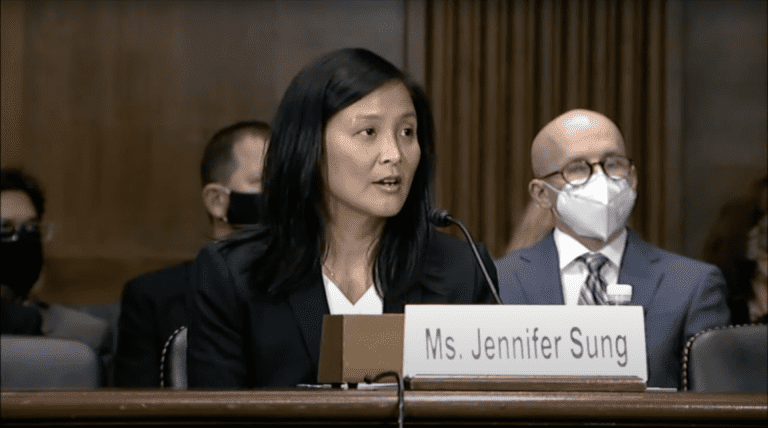
Tara Boghosian is a student at Harvard Law School and a member of the Labor and Employment Lab.
It was supposed to be the first union for food delivery app couriers in North America. In February 2020, the labor relations board for the Canadian province of Ontario found that couriers working for Foodora, a food delivery app, were eligible to unionize. Yet, before the union votes could even be counted, Foodora announced in April 2020 that it would be ending all operations in Canada, effective May 2020. This crushing outcome for the Foodora couriers who fought to unionize demonstrates the need to go further than strengthening existing labor law to protect workers’ rights, especially in the gig economy. Rather, as the Clean Slate Report outlines, we need to demand mechanisms that entrench worker representation within corporate governance—if not transform corporate governance altogether.
The campaign to unionize Foodora couriers in Ontario began in spring 2019 after couriers—who are classified as independent contractors in the vein of Grubhub, Doordash, and UberEats delivery drivers—raised concerns about working conditions. Couriers pointed out how the going rate for deliveries of $4.50 CAD per order and $1 per kilometer had not changed in years and did not include reimbursements for insurance, traffic fines, or bike and car maintenance. Workers also complained of the competitive and time-consuming process of signing up for shifts. And of course, like independent contractors in the United States, Foodora couriers did not receive benefits like paid sick leave or family leave; and received only minimal assistance for workplace injuries that happened regularly. As potentially misclassified independent contractors, they were also ineligible to unionize.
In May 2019, Foodora couriers launched a union drive with the Canadian Union of Postal Workers, and by early August voted on union certification. However, the vote results were sealed pending the decision of the Ontario Labour Relations Board to determine whether Foodora couriers were misclassified as independent contractors. In Ontario, rather than a dual framework of employees and independent contractors, provincial law also includes a third category of “dependent contractors” who are eligible to unionize. The inquiry into a worker’s classification as an independent contractor or dependent contractor depends, in broad terms, on whether the contractor is engaged in their own independent business; on the contractor’s degree of economic dependence on the employer; and on the degree of control that the employer exercises over the contractor. The Board assessed several subfactors in turn and concluded that Foodora couriers are dependent contractors—paving the way for the first food delivery app union in North America.
Yet, this victory was short-lived. In April 2020, Foodora announced that it was ending all operations in Canada by May 11, 2020, citing mounting debt and declining profits. Despite Foodora’s insistence that the union drive had nothing to do with it, that seems unlikely. COVID-19 social distancing has led to a surge in demand for food delivery in Canada and elsewhere. Indeed, Foodora’s Germany-based parent company, Delivery Hero, experienced record Q1 revenue. Moreover, Foodora’s decision to leave the Canadian market echoes its decision to leave Australia in 2018 after facing misclassification lawsuits and leaving millions of dollars in unpaid wages in its wake.
Indeed, we should not assume that Foodora is a unique case, even if the same outcome seems unlikely for U.S. gig economy companies that cannot easily leave large markets like New York or California. Before Foodora shut down, Foodora couriers believed that Foodora would not pull out of Toronto, one of its “most profitable markets.” Unfortunately, that was not the case. So long as companies perceive workers’ rights to be so unprofitable that corporate executives opt to shut down business completely rather than comply with the law, workers and advocates will play a never-ending game of whack-a-mole. As soon as workers succeed under the existing legal framework by securing proper classification and potentially a union, the company can leave that jurisdiction and try to evade the law elsewhere. Workers may still be meaningfully vindicated by securing backpay and other restitution, but worker power will not grow. The resulting need to strengthen and better enforce labor and employment law has been discussed in both the Canadian and U.S. contexts.
But what the Foodora case makes most clear is that we cannot look only at the labor and employment side of the equation. As the Clean Slate Report advocates, mechanisms for worker power must be created on the corporate side as well, and advocates must push for “stakeholder corporate governance” to replace the existing primacy of shareholder interests.
In the Foodora case, shareholder primacy drove the decision to leave the Canadian market. The Foodora board evidently concluded that leaving Canada would be more profitable for shareholders than staying. A framework of stakeholder corporate governance could have led to a profoundly different outcome. First, if 40% of the seats of Foodora’s Board of Directors were occupied by workers, the company might have afforded more weight to the impact on couriers of the potential decision to close Canadian operations. Worker representatives could have raised how couriers would be impacted by sudden job loss, not only after investing time and resources into organizing a union, but in the midst of a pandemic when food delivery is an essential service and couriers had already been risking their health to make deliveries.
Going even further, if Foodora executives had a fiduciary duty to workers—and the broader community—this duty would likely foreclose a decision to shut down operations unless no other option existed. Indeed, if a board was legally required to act in the worker’s best interests, leaving workers jobless in the middle of an ongoing union drive and a pandemic seems to be acting in workers’ worst interests. Not to mention that taking away a food delivery service during a pandemic does not serve Canadian consumers and the broader community.
Moreover, with a fiduciary duty to workers, Foodora may not have violated Ontario’s labor laws in the first place. Instead of trying to shirk workers’ rights in order to pass on the reduction in labor costs to shareholders, Foodora might have properly classified its couriers as dependent contractors or employees from the beginning of its operations in Canada. In turn, couriers would have had the right to unionize all along. If workers did not have to expend energy fighting the same threshold battles to secure proper worker classification and a union, they could instead turn their organizing efforts to securing improvements in working conditions beyond the bare legal minimum as well as a larger share of corporate profits. Reconceiving the purpose and governance of corporations will help make this possible.










Daily News & Commentary
Start your day with our roundup of the latest labor developments. See all
April 23
Supreme Court hears cases about 10(j) injunctions and forced arbitration; workers increasingly strike before earning first union contract
April 22
DOL and EEOC beat the buzzer; Striking journalists get big NLRB news
April 21
Historic unionization at Volkswagen's Chattanooga plant; DOL cracks down on child labor; NY passes tax credit for journalists' salaries.
April 19
Alabama and Louisiana advance anti-worker legislation; Mercedes workers in Alabama set election date; VW Chattanooga election concludes today.
April 18
Disneyland performers file petition for unionization and union elections begin at Volkswagen plant in Tennessee.
April 18
In today’s Tech@Work, a regulation-of-algorithms-in-hiring blitz: Mass. AG issues advisory clarifying how state laws apply to AI decisionmaking tools; and British union TUC launches campaign for new law to regulate the use of AI at work.